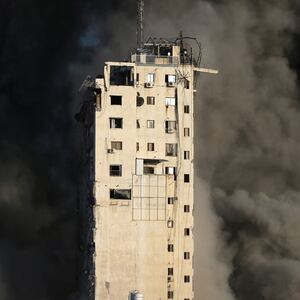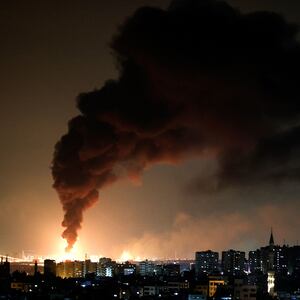Hospitals in the Gaza Strip were suffocated long before the most recent round of bombardment by Israeli forces. But now, health-care officials are faced with the impossible task of tending to the mounting number of citizens wounded in relentless attacks on the strip.
On top of the COVID-19 crisis that killed almost 1,000 and infected up to 100,000 residents of the enclave, health-care workers in Gaza are tasked with caring for the roughly 500 that have been injured in a barrage of airstrikes on the strip over the past few days.
“The situation here is very difficult, I can’t describe the horror in words,” a worker for the Red Crescent in Gaza told Haaretz on Thursday.
ADVERTISEMENT
Gaza’s healthcare system has long been plagued with shortages of medical supplies, doctors, and electricity, as well as a crumbling infrastructure. The pandemic was particularly hard on Gaza’s roughly 2 million residents, with researchers saying that infection rates are vastly underreported and that Israel’s siege of the enclave had exacerbated the COVID crisis even further.
“Israel’s blockade has devastated the economy in Gaza,” one researcher from European University Institute in Florence told Al-Jazeera in February. “And this is having a major impact on the ability of people to comply with lockdown measures when doing so means losing their already limited sources of income.”
Adding to the COVID crisis in Gaza is a lagging vaccination rate. Although Israel’s vaccine campaign was one of the most successful in the world, less than 1 percent of Palestinians have been fully vaccinated. Israeli officials have faced a barrage of criticism for failing to extend their vaccine efforts to Palestinians in Gaza and the West Bank.
The current violence sweeping the region, with Israeli airstrikes pummeling building after building—and the Hamas militant group firing hundreds of rockets back at Israel—has killed at least 83 Gazans, including 17 children. On the Israeli side, five civilians have died.
According to local news outlets, Gaza doctors are reporting dire shortages in blood supplies and hospital beds.
“There is no possibility of establishing coronavirus wards, there is full occupancy of hospital beds, and I’m afraid they’ll have to evacuate or release these patients to provide urgent treatment for the wounded,” a doctor with Physicians for Human Rights told Haaretz. “Treating the wounded will overburden the medical system, and the system for treating COVID-19 patients is also likely to reach the point of collapse.”
The influx of patients doesn’t appear to be slowing down anytime soon. Israeli Defense Minister Benny Gantz said on Thursday that the enclave will see “many, many more targets” hit in the days to come. Meanwhile, Gaza’s hospitals continue to struggle with the now double burden of devastating pandemic and a seemingly endless stream of wounded citizens.








